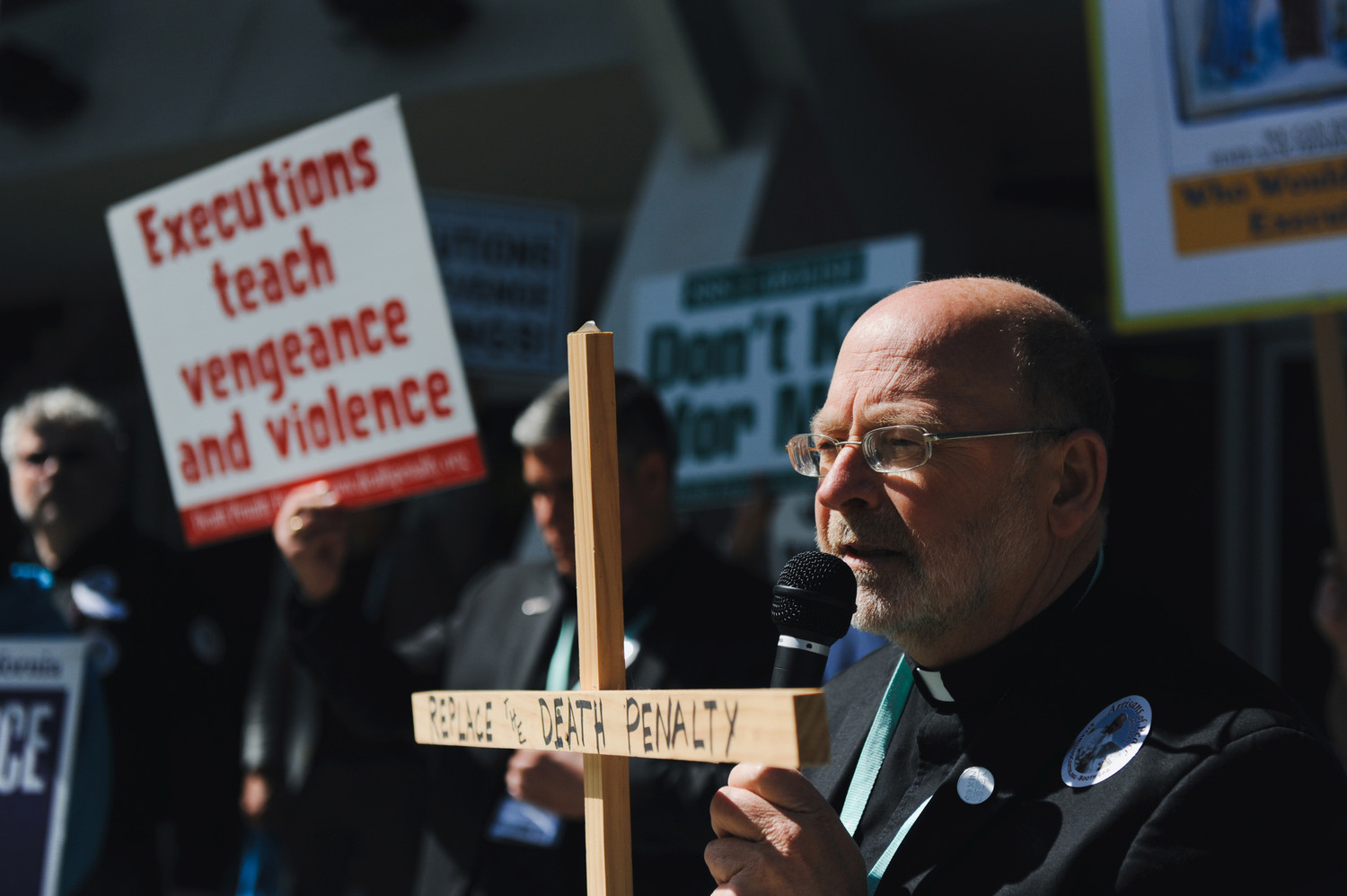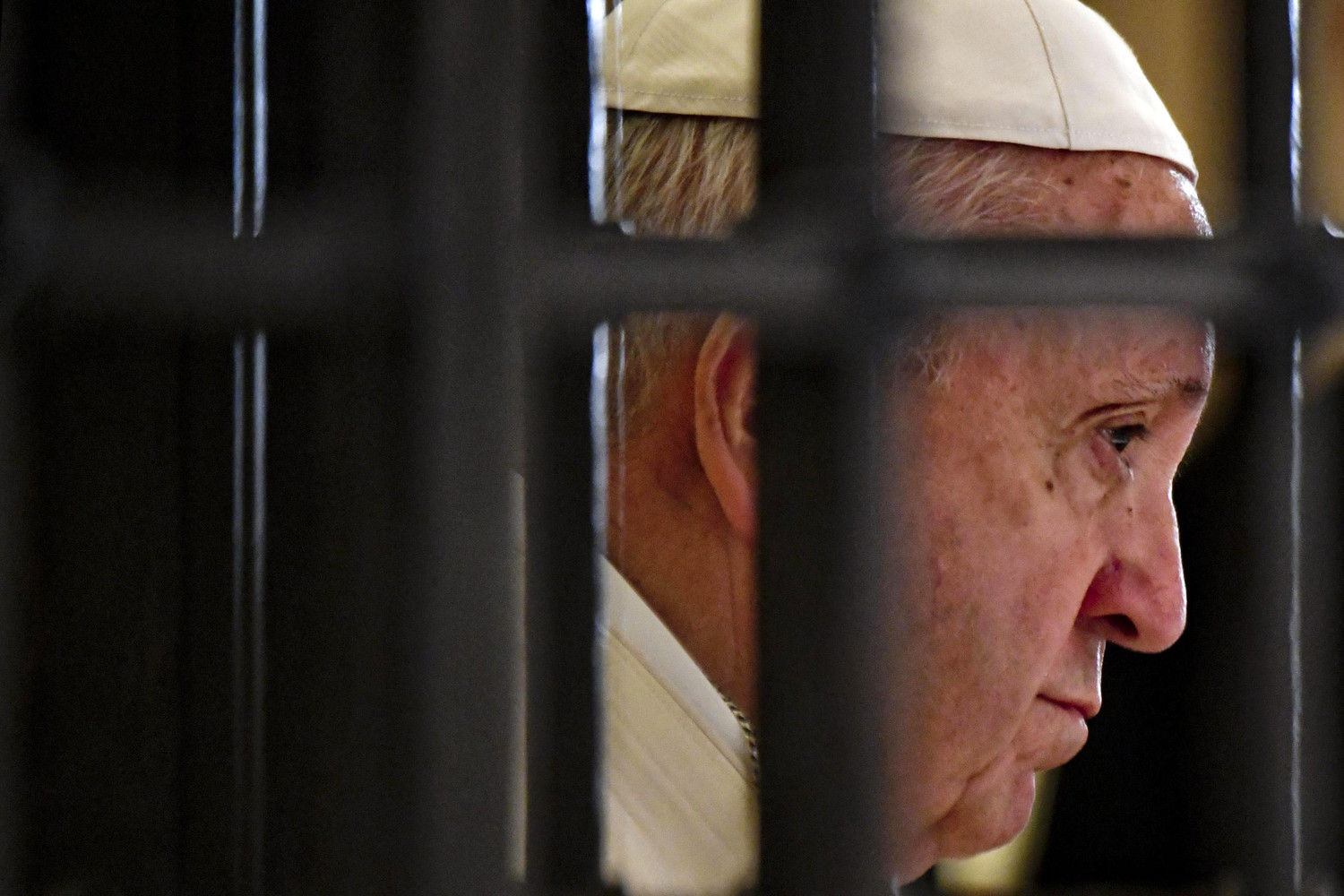Pope revises Catechism to say death penalty is ‘inadmissible’
Bishop McKnight gives thanks for the Pope’s action

Building on the development of Catholic Church teaching against capital punishment, Pope Francis has ordered a revision of the Catechism of the Catholic Church to assert “the death penalty is inadmissible because it is an attack on the inviolability and dignity of the person,” and to commit the Church to working toward its abolition worldwide.
The Catechism’s paragraph on capital punishment, 2267, already had been updated by Pope St. John Paul II in 1997 to strengthen its skepticism about the need to use the death penalty in the modern world and, particularly, to affirm the importance of protecting all human life.
Bishop W. Shawn McKnight of Jefferson City issued a statement Aug. 2 thanking Pope Francis for clarifiying the Church’s teaching on the death penalty.
“The death penalty violates the dignity of human life,” Bishop McKnight stated. “This awareness of the sanctity of every human being, regardless of their circumstances, deepens our gratitude to God for all life and increases our solidarity with all our sisters and brothers.”
Announcing the change Aug. 2, Cardinal Luis Ladaria, prefect of the Congregation for the Doctrine of the Faith, said, “The new text, following in the footsteps of the teaching of St. John Paul II in ‘Evangelium Vitae,’ affirms that ending the life of a criminal as punishment for a crime is inadmissible because it attacks the dignity of the person, a dignity that is not lost even after having committed the most serious crimes.”
“Evangelium Vitae” (“The Gospel of Life”) was St. John Paul’s 1995 encyclical on the dignity and sacredness of all human life.
The encyclical led to an updating of the Catechism of the Catholic Church, which he originally promulgated in 1992 and which recognized “the right and duty of legitimate public authority to punish malefactors by means of penalties commensurate with the gravity of the crime, not excluding, in cases of extreme gravity, the death penalty.”
At the same time, the original version of the Catechism still urged the use of “bloodless means” when possible to punish criminals and protect citizens.
The Catechism now will read: “Recourse to the death penalty on the part of legitimate authority, following a fair trial, was long considered an appropriate response to the gravity of certain crimes and an acceptable, albeit extreme, means of safeguarding the common good.
“Today, however, there is an increasing awareness that the dignity of the person is not lost even after the commission of very serious crimes,” the new section continues. “In addition, a new understanding has emerged of the significance of penal sanctions imposed by the state. Lastly, more effective systems of detention have been developed, which ensure the due protection of citizens but, at the same time, do not definitively deprive the guilty of the possibility of redemption.”
Pope Francis’ change to the text concludes: “Consequently, the Church teaches, in the light of the Gospel, that ‘the death penalty is inadmissible because it is an attack on the inviolability and dignity of the person,’ and she works with determination for its abolition worldwide.”
Helpful and consistent
Rita Linhardt, senior staff associate with the Missouri Catholic Conference (MCC), the public-policy agency of the state’s four Roman Catholic dioceses, believes the Pope’s action could help persuade lawmakers and policymakers to take a new look at the death penalty.
Since capital punishment was reinstated in Missouri in 1989 following a 12-year hiatus, the MCC has been urging lawmakers to declare a moratorium on the death penalty and undertake a thorough study on how it’s carried out in the state.
She said Pope Francis’ position on the death penalty is wholly consistent with the Church teaching on the inviolability of human life and the need for mercy and the opportunity for remorse and redemption.
“These are things we’ve been saying for years,” said Mrs. Linhardt, who specializes in public policy related to the death penalty and prison concerns, and is a co-founder of the Missourians for Alternatives to the Death Penalty (MADP). “In each of our clemency applications, we always highlight the dignity of the human person.”
She pointed to the statement Missouri’s Catholic bishops released in February 1999, following Pope St. John Paul II’s pastoral visit to St. Louis.
Preaching at Mass during that visit, he called for “a consensus to end the death penalty, which is both cruel and unnecessary.”
“To build consensus,” the bishops asserted, “we must create a climate in our state where there can be more open discussion of the death penalty and where opposing the death penalty is not seen as callous disregard for victims, or an indifference to law and order.”
Missouri’s bishops at that time invited all citizens, including the many Catholics who support the death penalty, “to acknowledge the sacredness of all human life and the need for forgiveness.”
“We believe in justice and therefore in punishment for taking another’s life,” the bishops stated in 1999. “We believe in mercy and therefore in punishment less than execution. We believe in forgiveness, we believe in personal redemption, we believe in hope and love, we believe that through the grace of God, violence can be stilled and our hearts changed from hearts of stone to ones alive and responsive to the will of God.”
“Mercy and dignity,” said Mrs. Linhardt. “It’s all there. It’s all tied together.”
Overjoyed and grateful
Joining other Catholic death penalty opponents, the chairman of the U.S. bishops’ domestic policy committee immediately praised the Pope’s declaration.
Bishop Frank J. Dewane of Venice, Florida, chairman of the U.S. Conference of Catholic Bishops’ (USCCB) Committee on Domestic Justice and Human Development, said the bishops welcomed the revision change.
In an Aug. 3 statement, he stressed: “All human beings are created in the image and likeness of God and the dignity bestowed on them by the Creator cannot be extinguished, even by grave sin, such that all persons, from conception until natural death possess inalienable dignity and value that points to their origin as sons and daughters of God.”
He said the USCCB has been calling for an end to the death penalty in the United States for decades.
Only God can judge
In announcing the changes, Cardinal Ladaria noted how Pope St. John Paul, Pope Emeritus Benedict XVI and Pope Francis had all spoken out against capital punishment and appealed for clemency for death-row inmates on numerous occasions.
The development of Church doctrine away from seeing the death penalty as a possibly legitimate punishment for the most serious crimes, the cardinal said, “centers principally on the clearer awareness of the Church for the respect due to every human life.”
Along this line, St. John Paul II affirmed: ‘Not even a murderer loses his personal dignity, and God Himself pledges to guarantee this.’”
Pope Francis specifically requested the change to the Catechism in October during a speech at the Vatican commemorating the 25th anniversary of the text’s promulgation.
The death penalty, no matter how it is carried out, he had said, “is, in itself, contrary to the Gospel, because a decision is voluntarily made to suppress a human life, which is always sacred in the eyes of the Creator and of whom, in the last analysis, only God can be the true judge and guarantor.”
Cardinal Ladaria noted that the Popes were not the only Catholics to become increasingly aware of how the modern use of the death penalty conflicted with Church teaching on the dignity of human life; the same position, he said, has been “expressed ever more widely in the teaching of pastors and in the sensibility of the people of God.”
In particular, he said, Catholic opposition to the death penalty is based on an “understanding that the dignity of a person is not lost even after committing the most serious crimes,” a deeper understanding that criminal penalties should aim at the rehabilitation of the criminal and a recognition that governments have the ability to detain criminals effectively, thereby protecting their citizens.
The cardinal’s note also cited a letter Pope Francis wrote in 2015 to the International Commission Against the Death Penalty.
In the letter, the Pope called capital punishment “cruel, inhumane and degrading” and said it “does not bring justice to the victims, but only foments revenge.”
The staff of The Catholic Missourian contributed information to this article.
Comments
Other items that may interest you
Services
The Catholic
Missourian
2207 W. Main St.
Jefferson City MO 65109-0914
(573) 635-9127
editor@diojeffcity.org







